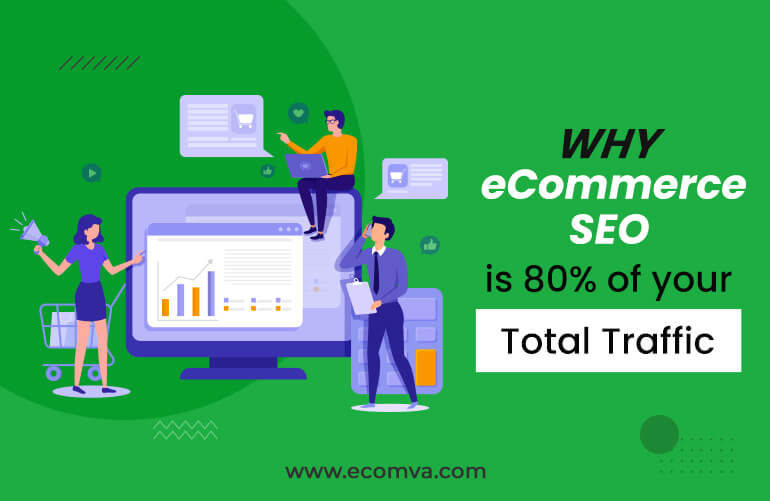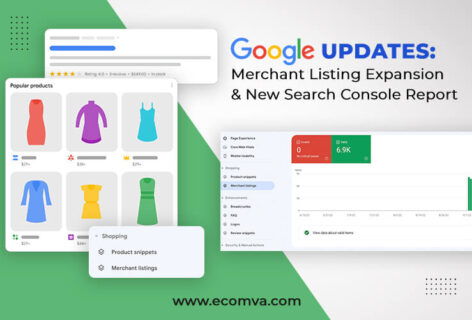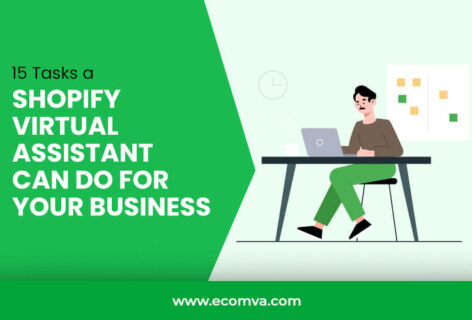E-commerce SEO: Why ecommerce SEO is 80% of your Total Traffic?

There is always a strong pillar standing behind a successful online business. SEO is one such pillar, but it only works if you implement it with the right strategies and optimize the online platform properly. Even with years of experience, a single miss can cause huge opportunity loss.
People are spending years building an ecommerce website, but you might be unable to gain the targeted traffic.
In this content piece, we will be revealing the strategies used by some top ecommerce SEO agency.
Don’t you want to know exactly ecommerce SEO and how it affects business?
What is ecommerce SEO?
It is a free method to get more traffic to the website by increasing its visibility on SERPs (Search Engine Result Pages). A good ranking page means more attention from the visitors means more opportunity to gain quality traffic.
To ensure higher rankings, you need to optimize the website from using the right keywords to setting the technical section of your ecommerce store. Several methods used by the ecommerce SEO agency are:
- On-Page SEO: This is the method to optimize the web pages on ecommerce websites to help you achieve better rankings. It integrates the right keywords for specific information, picture alt-text, URLs, and tags.
- Off-Page SEO: These are the operations applied outside the ecommerce website, and the websites need to gain higher rankings. Such as content marketing, consumer promotions, online marketing, and search engine optimization are some off-page SEO strategies.
- Technical SEO: The technical elements help you scan and index the content on your web page effortlessly. You also get a choice to create a sitemap or provide faster page loads. It is crucial to eliminate any redundant records or optimize the information for mobile users.
- Local SEO: This helps increase physical visitors if you have a local business. This SEO will increase visitor numbers by generating a Google map for your organization.
How to develop a strategy for ecommerce SEO?
Your website has tons of products and services. It will take some time, but you will be able to see the results with the right methods. Some ecommerce SEO company follows the shortest approach to handle the SEO for your business:
- Set your priorities: It is important to know the pages receiving the most traffic. Moreover, if you want the visitors to focus on certain products, then start optimizing them first.
- Build a workflow: Search Engine Optimization helps to meet certain requirements. It helps select keywords, add metadata, name images, add Alt tags, and integrate keywords in the right categories.
- Check the competition: The ecommerce SEO strategy should be designed to win the match. It is crucial to research the competitor’s websites and check their SEO strategies and efforts. This helps to know if you will understand if you apply the right strategy and beat the competitors.
- Track the CRO: The Conversion Rate Optimization gives you the correct information about your performance in the market. Whether your strategies are working in your favour or not.
How is ecommerce SEO bringing 80% of the organic traffic on the website?
-
Understand the type of keywords that you need to use
Unlike many websites, your online store depends on transactional-based keywords. They are the terms or combinations of words that the customers use while looking for your products. These keywords should be integrated into the product and category pages.
Many online tools help to research the right keywords for your business. You want the online users to reach the right destination without putting more effort and go through complicated procedures. An SEO virtual assistant will use various tools to curate the best keywords for your brand recognition. -
Build unique content for your ecommerce store
The biggest challenge for an ecommerce store is the content and avoiding the thin pages. They are web pages with minimal or no content and do not rank on the search engines. The ecommerce pages are competitive, and it becomes a huge responsibility to optimize them for better reach.
-
Optimize the product category pages
These web pages are used to segment the products on ecommerce stores. Sometimes the product category pages are ignored in the content marketing strategy. These pages are as vital as product pages, so ensure to optimize them to reach a wider audience. Quick tips for handling product category pages are:
- Add a paragraph to explain the category. The content should be small, readable, and easier to scan.
- Include the product descriptions on the category page. Inserting just an image and title is not enough. The product description helps increase the content volume to enhance the user experience and meet their expectations.
-
Improve the product pages
This might be challenging because the content is just half of the customer experience. Avoid duplication as it would lead to penalizing the website and create a negative impact on the visitors. If you do not provide the right content, you might lose potential leads. The competition gets a little intense, and you cannot simply copy and paste the content from other platforms.
Ensure to understand the touch, taste, and interest of the audience. They will view the images and read the description to decide. Aim to create content to provide a great user experience. If you still feel lost, consider hiring a virtual assistant, as they have all the knowledge and resources to optimize the product pages. -
Implement Schema Markup
It is an HTML markup that defines the product or relevant information. The goal is to highlight your products and services. Some of the things you need to include in this section are:
- Name of product
- Description of products
- Price of the products
- Number of products in stock
- Rating and reviews of products
The structure information helps the search engines understand the product and ensure they are indexed. This means you have a better chance to reach search result pages and target potential customers. Schema is crucial because it ensures that the products and websites are correctly indexed.
-
Include Testimonials and Reviews
The best ecommerce SEO company knows that a great marketing method is word of mouth. If people from your known circle recommend products or services, you will be highly likely to consider them. Social proofing means adding reviews to increase sales and build trust between the brand and customers.
-
Optimize the page loading speed
More than 80% of the users prefer mobile devices to buy products and services. And this is the fastest-growing method to handle online activities. Mobile device is one of the top devices used to drive sales and traffic. A slow website means a bad user experience and losing revenue for your business.
Product websites deal with tons of pictures that slow down the website. Try using various online tools to optimize the images and ensure it does not hinder the website loading speed. Allow caching that is temporary storage that provides faster viewing.
Endnote!
As an ecommerce SEO agency, we understand that a minor mistake can lead to a big blunder in the online business. It is vital to follow standard practices for ecommerce SEO to generate sales and build a strong customer base.







